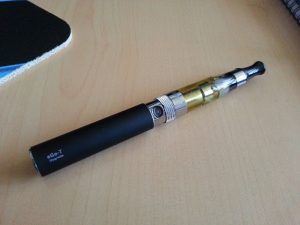Survey Shows E-Cigarettes Reduce Tobacco Craving in Users Who Recently Quit Smoking
A new cross-sectional survey carried out by Professor Jean Francois Etter, from the University of Geneva, Switzerland, revealed that electronic cigarettes help reduce craving for tobacco in users who recently quit smoking.
 Professor Etter analyzed the data collected via internet from a pool of 374 e-cigarette users who had recently quit smoking. They were enrolled through websites dedicated to electronic cigarettes and smoking cessation, and asked to answer a series of questions regarding perception that e-cigarettes attenuate craving for tobacco cigarettes, characteristics of e-cigarettes used, modifications of their devices, patterns of e-cigarette use, reasons for using e-cigs, satisfaction with e-cigarettes, dependence on electronic cigarettes and personal characteristics.
Professor Etter analyzed the data collected via internet from a pool of 374 e-cigarette users who had recently quit smoking. They were enrolled through websites dedicated to electronic cigarettes and smoking cessation, and asked to answer a series of questions regarding perception that e-cigarettes attenuate craving for tobacco cigarettes, characteristics of e-cigarettes used, modifications of their devices, patterns of e-cigarette use, reasons for using e-cigs, satisfaction with e-cigarettes, dependence on electronic cigarettes and personal characteristics.
Results showed that the strongest attenuation of craving for tobacco was obtained when using higher concentrations of nicotine in refill e-liquid, advanced modular system vaporizers (mods) and high voltage batteries. The relief effect of e-cigarettes on tobacco craving was also associated with more intensive use (more puffs per day and more e-liquid used). Professor Etter observed that users who reported a higher degree of satisfaction with their e-cigarettes and responded that e-cigs helped them quit smoking had a low craving for tobacco. However, participants who reported the strongest effects on craving for tobacco were also the most dependent on e-cigarettes and had the strongest urge to vape.
Jean Francois Etter concluded that “From a public health perspective, there is a trade-off between e-cigarettes that provide high levels of nicotine, high satisfaction and more effects on craving for tobacco, but may also be addictive, and e-cigarettes that contain less nicotine and are less addictive, but are also less satisfactory and less efficient at relieving craving and at helping dependent smokers quit smoking. This trade-off must be kept in mind when regulating e-cigarettes.” Etter’s research was published in the online journal Drug and Alcohol Dependence.
Incidentally, these findings were confirmed by French tobacco addiction expert Jacques Le Houezec, in a recent interview with Techniques de l’Ingenieur. He emphasized that to absorb the same amount of nicotine a smoker gets from a tobacco cigarette in five minutes, an e-cigarette user must vape between 30 minutes and an hour, depending on what kind of device he is using. “In order not to get the urge to smoke, an e-cig user must vape regularly”, Le Houezec said.
Regarding the few studies that contest the efficacy of electronic cigarettes as smoking cessation aids, Le Houezec clarified that they analyzed 1st generation e-cigarettes (cigalikes) which are now known to be inefficient when compared to 2nd and 3rd generation vaporizers (eGo style e-cigarettes, mods, etc.). He mentioned a study of advanced electronic cigarettes is already underway, but its results will only be available in a year or two.
Dr. Jacques Le Houezec also touched on the issue of nicotine addiction. He noted that people should differentiate between addiction and dependence. “Addiction is a dependence that damages your health,” Le Houezec said. “If electronic cigarettes reduce health risks, I think it’s a good thing for the person using it.” Interestingly, Dr. Philippe Presles, a well-known smoking cessation specialist, also emphasized the difference between the two terms during a French radio show, last week.
Asked why there is so little research done on a such a controversial product as the electronic cigarette, Dr. Le Houezec said many studies have been conducted in recent years. However, as we mentioned before, most of them aren’t even picked up by mainstream media unless their findings put e-cigarettes in a bad light. Le Houezec did mention that public funding for electronic cigarette studies is difficult to obtain, so much so that Dr. Konstantinos Farsalinos had to resort to crowdfunding to finance his research. Indeed, Dr. Farsalinos conducted a successful campaign on crowdfunding site Indiegogo for his project – E-Cigarette Research: Temperature of Evaporation.
















